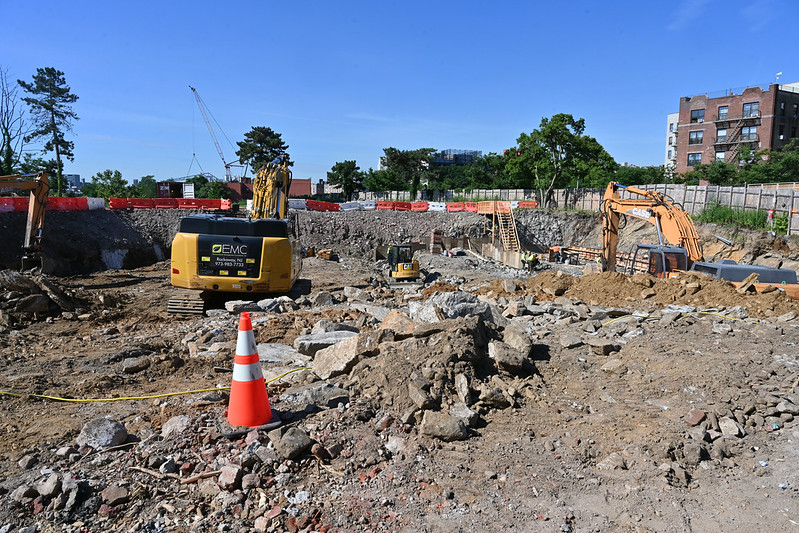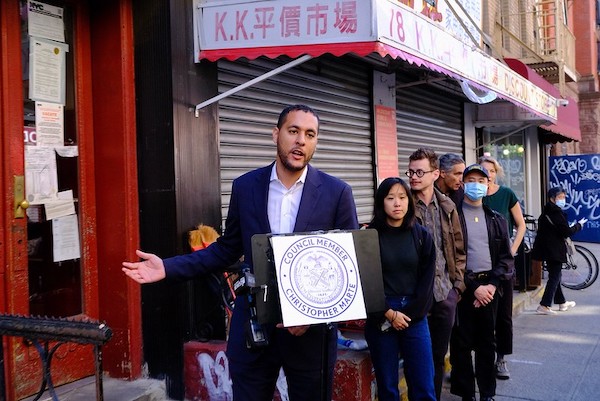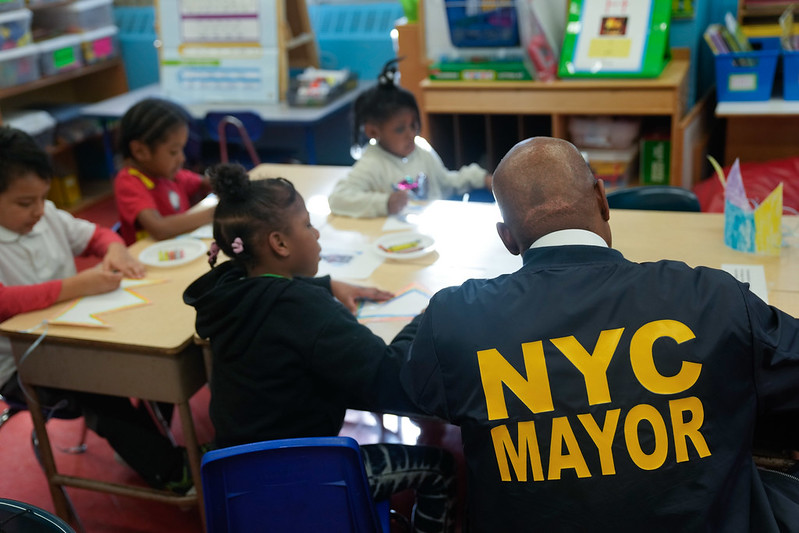Keep The Compact: The Legislature's Lackluster Housing Plans Won't Work

Housing in the works (photo: Kevin P. Coughlin/Governor's Office)
Housing has taken center stage in the current budget negotiations in Albany and for good reason: Our statewide housing crisis has become dire, and for the first time in decades, there are many concrete proposals to tackle it.
Discussions about the issue often focus on rents in the five boroughs and how they have reached historic levels, but the crisis does not stop at the city’s borders, nor is the crisis limited to renters. In communities across the state, renters and homeowners are struggling with housing costs, as younger generations are unable to find affordable housing in their hometowns, local governments are unable to hire teachers and firefighters, and seniors must move further away from their families or are stuck in homes that do not accommodate their current needs.
These problems share a common cause: New York has failed to enact a statewide approach for promoting housing growth, providing localities with free rein to make new housing illegal across the state.
But for the first time since the 1970s, the Governor has proposed a framework to plan for sustainable growth in every community. The New York Housing Compact focuses on housing production, aiming to close our housing shortage by encouraging the construction of at least 800,000 homes over the next decade.
Unfortunately, this past week both the State Senate and Assembly proposed major cuts to the Housing Compact that would severely weaken its potential impact. If enacted, their proposals would do little to dent the dire housing crisis; instead, they would maintain the inequitable status quo that we've had for too long. In the face of the first real pro-housing framework that Albany has debated in decades, the Legislature seems to be closing its eyes and hoping the crisis goes away.
In its budget resolution, the Assembly deleted almost every piece of the Compact, including seemingly non-controversial items like enabling outdated office buildings in New York City to convert to housing. The Senate kept the office-to-residential piece, but otherwise, it also nixed all of the Compact’s many tools to encourage new housing growth of all kinds across the state.
In an apparent attempt to save face, the Senate and Assembly included a toothless version of the Governor’s proposal to require every community to grow its housing by a small amount every three years. Instead of imposing even minimal consequences on localities that shut their gates, the Senate’s and Assembly’s versions would try to bribe local governments to plan for housing growth.
While a program like this might sound new, it really just maintains the status quo—towns across New York already receive more money from a variety of county and state sources when they grow, and yet there is still anemic housing growth in the New York City metro region despite rapid economic growth. Similar incentive-based programs in Massachusetts, Connecticut, California, and Washington have failed for decades—particularly in the areas with the least housing growth, most extreme prices, and closest proximity to cities and transit— and there is no reason to think that the Senate’s and Assembly’s proposals will succeed in New York.
The Senate and Assembly included one new and laudable housing initiative, the Housing Voucher Access Program (HAVP), which would provide crucial financial assistance to an estimated 13,760 New Yorkers over the next few years. But as many recent news reports have shown, even New Yorkers who receive these new vouchers may struggle to use them, because there are so few safe and affordable apartments available to rent in New York. While the Senate and Assembly seem to think that the State must choose between policies that support vouchers and policies that support new housing growth, the two in fact need to go hand-in-hand.
As budget negotiations enter their next stage, the Governor needs to fight to keep the Compact strong, while also moving forward with policies in which the Legislature has rightfully signaled interest, such as HAVP and new tenant protections for New Yorkers who live in unregulated housing.
A statewide framework that includes real mandates to end exclusionary zoning practices, encourage housing growth in transit-rich areas, and ensure all neighborhoods do their part to increase housing opportunities is essential for addressing the depth of the crisis and increasing leverage for renters. It is long past time for New York to enact a framework like the Housing Compact.
***
Andrew Fine is Policy Director for Open New York. On Twitter @andrewdfine.
***
Have an op-ed idea or submission for Gotham Gazette? Email This email address is being protected from spambots. You need JavaScript enabled to view it.
City Council Member Christopher Marte Fails a Big Leadership Test

City Council Member Christoper Marte (photo: Gerardo Romo/NYC Council)
[Update: Less than 48 hours after the publication of this op-ed, Council Member Marte announced he had accepted Steven Wong's resignation]
It has been a month since a top aide to City Council Member Christopher Marte unleashed a vicious, misogynistic, profanity-laced verbal assault on one of the city’s most prominent and respected Chinese-language reporters for the “crime” of covering the Democratic City Council primary in a way he did not like.
And the Marte aide, Steven Wong, made these comments in multiple voicemails he left for the reporter, who transcribed the recordings, and turned it over to the City Council Speaker’s office for investigation.
Despite all that time, and especially since the comments were recorded, there has been no action taken by the Council leadership or Council Member Marte. In fact, Marte said this week the comments were “not unforgiveable” as he said he would keep Wong on his staff and on the public payroll. Why?
Marte, whom I am challenging in June’s Democratic primary, first said he could not remove Wong from his office payroll without a full investigation. But staffers in the City Council general counsel’s office, and even the head of the union representing Council staffers, said that is not correct.
Wong is an at-will employee. Marte could have, and should have, fired Wong. He knows it. I know it. And voters now know it as well judging from the comments I get from constituents as I campaign across Chinatown and Lower Manhattan’s Council District 1.
“This language would not have been tolerated in any kind of private employment environment, and it should not be tolerated on taxpayer-paid salaries,” one constituent, Community Board 3 member Karlin Chan, told Marte at a meeting. “If he worked for a private company, he would have been terminated already.”
The language Wong used is breathtaking, especially as we continue to commemorate Women’s History Month. In his taped voicemails, he called the reporter a “c—t,” and made a crude sexual comment about her mother, as well as comparable remarks about me.
The story that prompted Wong’s outburst, as recounted in The Daily News, was Marte’s feeble attempts to have it both ways when it comes to his position on the so-called defund the police movement, which is very unpopular among Lower Manhattan voters, especially those in Chinatown, who have been wrestling with increased crime rates, including an appalling rise in hate crimes targeting Chinese residents and AAPI residents more broadly.
Marte on one hand claims he does not support defunding the police, but signed on to the Progressive Caucus’ pledge to “reduce the size and scope of the NYPD.” Almost half of the members of the Progressive Caucus refused to sign that pledge and left the caucus, but Marte stayed.
It was a story on that attempt to straddle such a critically important issue that ran in Sing Tao Daily, one of the Chinese communities’ most respected newspapers, that led to the grotesque sexist attack by Wong on reporter Lotus Chau. There were multiple voicemail messages; Wong knew what he was doing.
One of the great strengths of New York City is that, even as the traditional mainstream media has withered in the face of technological advances and corporate takeovers, independent media – in English as well as the variety of languages immigrants speak in their homes and on the streets – have become more and more important in hearing the voices of all residents, no matter where they come from. There is a vigorous Chinese language media, with competing papers that serve the community, as there are newspapers in Spanish, Yiddish, Russian, Creole, and other languages heard throughout New York City.
Wong’s attack on this reporter is in many ways a threat to the independence of the alternative media where so many New Yorkers learn about civic affairs. The threatening tone and the abusive language can only be seen as an attempt to suppress and intimidate the independence of those outlets. Knowing the targeted reporter, I am sure she will not be intimidated.
As a woman, as an immigrant, as a Chinese-American and a member of the broader AAPI community, I am running to stand up to bigotry and misogyny wherever it rears its ugly head.
I know that ‘politics ain’t beanbag,’ as the saying goes. It can be rough and tumble, but there have to be limits to acceptable behavior. Steven Wong’s crude, sexist, bigoted, threatening comments are not a close call. Christopher Marte should step up and do the right thing and dismiss Wong from the public payroll. If he cannot see his way clear to do that, maybe he should just step aside himself.
[Update: Less than 48 hours after the publication of this op-ed, Council Member Marte announced he had accepted Steven Wong's resignation]
***
Susan Lee is a candidate for City Council in Lower Manhattan’s District 1 in the June Democratic primary. On Twitter @susanleenyc.
***
Have an op-ed idea or submission for Gotham Gazette? Email This email address is being protected from spambots. You need JavaScript enabled to view it.
Mayor Adams Is On The Right Track: New York City Should Prioritize Addressing Disabilities Early

Mayor Adams in school (photo: Michael Appleton/Mayor's Office)
New York City Mayor Eric Adams understands the challenge faced by the city’s nearly 1 million New Yorkers living with a disability – and the importance of diagnosing and addressing disabilities early. It was not until he was in college that he discovered he has dyslexia, with which he has contended all of his life and now informs his policy-making.
Early diagnosis is key, but it must be accompanied by strategies to address the disability. That’s where New York City has an opportunity to set a new, cost-effective, national standard through collaboration among government, the nonprofit sector, and the business community.
Mayor Adams took an important related step when he announced last Spring a plan to screen nearly all public school students for dyslexia, to provide additional educational support to students with dyslexia at 80 elementary schools and 80 middle schools, and to open two dyslexia programs (in Harlem and the South Bronx) with the goal of expanding to all boroughs this year.
In his 2023 State of the City Address, the mayor reported on the plan’s implementation, highlighting, among other developments, “launching the first district school in city history dedicated solely to supporting students with dyslexia, and making dyslexia screenings available in every public school in New York City.”
The greater need, of course, is to address disabilities more broadly defined and to provide services in school to help the tens of thousands of students with disabilities envision and prepare for success in college and career opportunities.
The nonprofit Institute for Career Development (ICD), which we lead, launched in the Fall a two-school pilot program that does exactly that and provides a model that we hope can grow to be citywide. The pilot program was launched in partnership with Discovery High School in the Kingsbridge Heights section of The Bronx and Richmond Hill High School in Queens.
Through the initiative, ICD now has on-site at each school a full-time Navigator available to work with any student who has an Individualized Education Program (IEP) or 504 plan to prepare the student to make the jump to college or vocational training and embark upon a career. The Navigators, whose services in the pilot program are available at no cost to students or schools, will guide students around obstacles and over hurdles as they work to build skills needed to launch fulfilling careers.
There’s a vital role for other nonprofit organizations and the business community in this regard. Scaling will require broader partnerships, and the students will need practical, after-school, work experience. Montefiore Medical Center, for instance, is already providing volunteer service opportunities for the Discovery High School students. At Kingsbridge Heights Community Center, the students are providing support for a community food pantry as well as after-school programming for middle school students.
As students identify specific career ambitions, other collaborations will be needed. Cisco, for instance, partnered with the Mayor’s Office for People with Disabilities and ICD to create the AbilITy Cisco Academy, the first fully accessible computer networking certification program for New Yorkers with disabilities. The Academy offers a variety of training programs where people with disabilities can earn industry-recognized skills and certification. Here, too, practical work experience, including internships, is crucial to demonstrating the students’ capacity to work in challenging settings.
Expanding services early to people with disabilities is vital to helping them get off to a fast start, with a clear sense of direction and the specific skills to propel them, and the need is great in terms of scale and societal impact. Experts estimate that as many as 20% of students are dyslexic, which represents 80-90% of all those with learning disabilities, and more than a third of prison inmates are dyslexic. Those statistics don’t even address other disabilities.
The cost of providing these services can be justified both by the enhanced career trajectories of the students (and related increased income tax revenue) and by societal costs avoided (such as preventable criminal justice involvement). The practical work experiences similarly help nonprofit organizations fulfill their missions and enable businesses to identify potential future employees.
Addressing early the needs of New Yorkers with disabilities is a winning strategy for all. Mayor Adams is pointing the way. The nonprofit sector and the business community should join with the City of New York to make it a priority in the year ahead.
***
Diosdado G. Gica and Joseph T. McDonald III are Co-Presidents of the Institute for Career Development, based in New York City. On Twitter @icd_nyc.
***
Have an op-ed idea or submission for Gotham Gazette? Email This email address is being protected from spambots. You need JavaScript enabled to view it.




